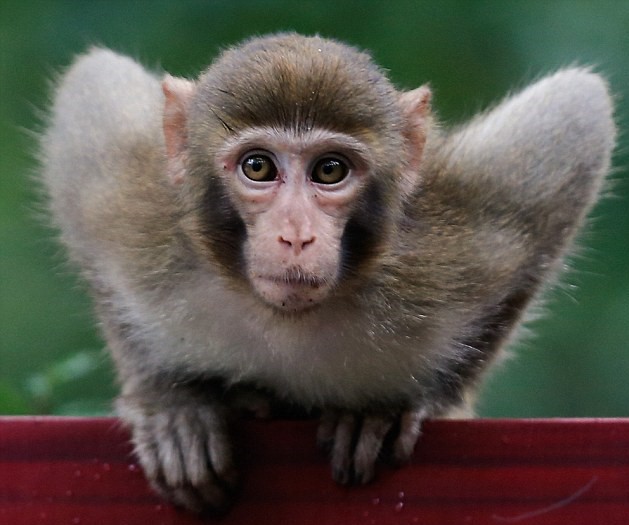Go monkey, go. The feral freedom fighter remains in hiding, presumably in the Tampa Bay area, a fledgling outlaw that lit up emergency switchboards Thanksgiving Day. Is the monkey hungry, thirsty? Does the monkey need any help? Is the monkey playing it smart?
The answers: No, no, definitely no, and probably, wildlife and animal experts said.

"I can tell you that they do seem to run much faster when in trouble," said Dr. Fred Bercovitch of the Primate Research Institute in Kyoto, Japan.
It takes a special fugitive monkey to rouse the Tampa Bay area. The Mystery Monkey ran free almost four years, practically sneering at authority every step of the way, and had a Facebook page with 84,707 likes until his capture two years ago.
“It would not surprise us,” the FWC's Gary Morse said, “to find this [monkey] is another rhesus macaque, based on the fact that males from the wild troop in Silver Springs, on occasion, disburse throughout Central Florida.”
"I don't know that anybody has accurately clocked a rhesus monkey."
» Dr. Fred Bercovitch, primatologist
The hijinks ended in October 2012 when the Mystery Monkey was tranquilized with two darts in St. Petersburg’s Lake Maggiore neighborhood.
Morse said the new monkey might not even be a monkey. "We hesitate to speculate on the identification of the species of animal since eyewitness reports are somewhat sketchy and we have no photographic evidence.”
On Dec. 3, a motorist braked for the monkey crossing U.S. 301 and did a double-take. “That thing was hauling … on all fours. At first I thought it was a cheetah.”
"I don't know that anybody has accurately clocked a rhesus monkey," Berkovich said. "I've seen younger males chased by older males during the breeding season, bolt through bushes, jump over rocks, dash across the sandy beach, and continue into the sea in order to avoid being attacked."
For FWC officials, the first concern is public safety. They warn most rhesus macaques carry simian herpes-B virus, and are strong, capable of seriously injuring an adult human.

"Beyond getting bit, the animal might cause a traffic accident," Morse said in an email. “Under no circumstances should the public attempt to approach, feed or capture this animal.”
The Mystery Monkey became a streetwise celebrity, easily eluding law enforcement. He was possibly a junkie, too, reportedly adapting to the dosage of at least a dozen tranquilizer darts during his freedom flight. Witnesses swear he checked both ways for traffic before crossing roads.
"Like humans, they can try to dash away to avoid an oncoming car, but, like humans, they probably sometimes don't succeed," Bercovitch said. "If they are simply wandering about, then they might look at road conditions before crossing. I suspect they are not swiveling their head right to left and back again to check out the traffic; my hunch would be more a glance in either or both directions."
The Mystery Monkey roamed from Clearwater to Temple Terrace and South St. Petersburg. For the new monkey, Tampa might be a break from the rat race.
"Rhesus monkeys aren't the only ones who like cities," Bercovitch said. "Think of coyotes, raccoons, deer ... Simply because a natural habitat is present doesn't mean that an animal will prefer that area over an unnatural habitat."
And there are creature comforts to consider, said Dr. Sarah Hrdy, a Harvard anthropologist.
"Why a city? Food is an obvious draw," Hrdy said. "Especially if some [people] are provisioning them, either intentionally or by accident. Delectable garden produce perhaps?"
The Mystery Monkey was harbored slyly in several neighborhoods, a celebrity, lounging on rooftops and lanais. The only thing missing was a Sundance Kid to keep him company.
The new monkey "could be, for some reason, looking to join a new troop," Hrdy said. "Rhesus macaques live in close association with humans all over India, where they are considered sacred."
Morse said the FWC is not actively searching for the monkey, technically an invasive species. In the event of a sighting, extra precautions will be taken, partly because of possible "fight-or-flight responses.”
“A search of this type would take significant resources, time and taxpayer dollars,” Morse said. “And likely be fruitless because of this animal’s ability to cover large distances and avoid detection.”
Upon his capture, the Mystery Monkey was named Cornelius (Planet of the Apes) by a sympathetic woman he bit. Elizabeth Fowler said she felt “kind of guilty.”
No worries.
“He looks great,” said Kathy Stearns, director of Wild Things, an educational zoo in Dade City, where Cornelius lives today. “He’s in his prime.”
Accounts differ but Stearns said Cornelius is 17- to 20-years-old. Stearns said he is trim, not a porky 45-pound junk-food lover when apprehended. “He’s happy,” Stearns said. “This last month we gave him a girlfriend [Cora is her name], so he’s really happy.”
The FWC hotline to report a sighting is 888-404-3922. There is no reward for information that leads to the monkey’s capture. Rewards for tips are provided mostly for FWC violations. So unless the monkey annoys a manatee or a sea turtle, he’s cool. For now.
“Monkeys – if this is what it is – are notoriously difficult to capture.” Morse said. “If we get a call [and] the animal is present – and the location and conditions are conducive to its capture without further endangering the animal – we will respond.”
Go monkey, go.
Outside
Bitcoin mining emissions in China will hit 130 million tonnes by 2024 https://t.co/w6He7so8N2 pic.twitter.com/qYUDtBdeRK
— New Scientist (@newscientist) April 9, 2021
The Gunk Report
For the Blue-Green Algal Bloom Weekly Update from the Florida Department of Environmental Protection, tap here. For DEP's Algal Bloom Sampling Map, tap here.
What, me worry?
» "PLAYING WITH SHARKS," which recently premiered at the Sundance Film Festival, documents diving legend Valerie Taylor.